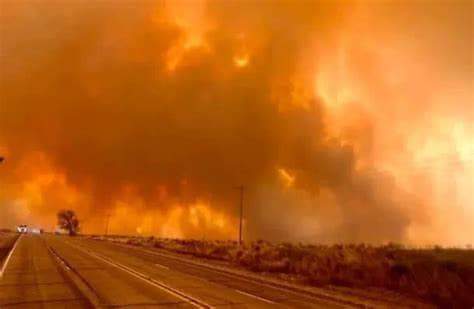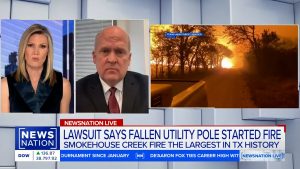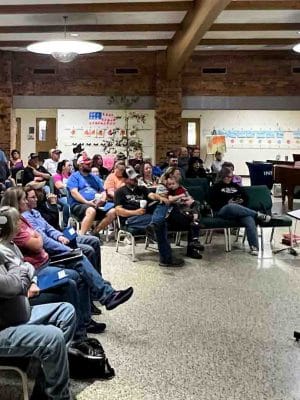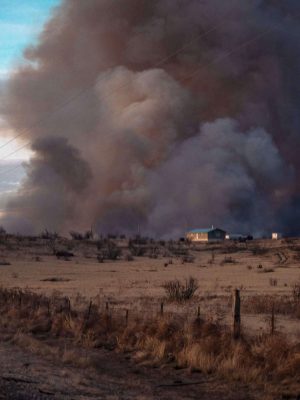Mikal Watts Spreads the Word about the Texas Panhandle Fire

Mikal Watts Spreads the Word about the Texas Panhandle Fire
In February 2024, a catastrophic wildfire tore through the Texas Panhandle, burning 1.1 million acres, destroying countless homes, ranches, and livestock, and claiming at least three lives. Amidst this devastation, Mikal Watts of Watts Law Firm LLP joined forces with Scott W. Sherwood of Sherwood & Sherwood P.C. and Joe L. Lovell of Lovell Hoffman Law PLLC, to lead a legal charge against Xcel Energy and two other defendants.
Mikal Watts is not only focused on the courtroom battle but is also deeply engaged in community outreach. The team has been holding town hall meetings with wildfire survivors, providing crucial updates on the investigation’s progress and the ongoing lawsuit. These meetings are pivotal for keeping the affected communities informed and involved.
The litigation strategy takes on a two-pronged approach in addressing the aftermath of the Texas Panhandle fires: securing comprehensive compensation for the survivors through legal channels, and vigorously spreading the word to the media to elevate public awareness. This strategy highlights Mikal Watts’ commitment not only to justice but also to informing the broader public and utility companies about the critical need for safety over profits. By raising awareness through extensive media engagement, Watts aims to underscore the importance of preventing such disasters in the future, moving towards making his wildfire litigation practice obsolete.
Legal Battle Unfolds: The Case of McQuiddy vs. Xcel Energy
Plaintiff and wildfire survivor Melanie Lee McQuiddy stands at the forefront of the battle for accountability, initiating a pivotal lawsuit against Xcel Energy Services Inc., Southwestern Public Service Company, and Osmose Utilities Services Inc. In an act of bravery, McQuiddy confronts these utility giants, representing not just her own profound loss but also the shared devastation of her community.
This tragedy extends beyond her, as many faced similar fates: homes vanished, businesses ruined, and the lifeblood of the community, its ranches and livestock, decimated. McQuiddy’s litigation is a call to action, challenging the negligence that led to such widespread destruction and advocating for the countless lives upturned by the disaster.
The crux of the lawsuit accuses the defendants of failing to properly inspect, maintain, and replace a wooden utility pole that splintered and collapsed, sparking the fire. It further asserts that such negligence is part of a broader pattern of utility-caused wildfires across the United States, with the legal document referencing significant fires in states like California, Oregon, New Mexico, and Hawai’i, where utility equipment failure was identified as the cause. This contextual backdrop not only underscores the magnitude of the issue but also frames the lawsuit within a larger narrative of recurring utility negligence leading to widespread destruction.
Strategic Collaboration with Local Counsel
Mikal Watts is distinguished by his pragmatic and diligent approach to environmental and wildfire litigation. His career is marked by significant legal victories and settlements that not only brought compensation to those affected by utility-caused disasters but also spurred changes in how utility companies manage and maintain their infrastructure. Notably, Watts played a pivotal role in negotiating a $13.5 billion settlement with PG&E for the 2017 and 2018 California Campfires. This landmark settlement not only provided substantial compensation to those impacted by the fires but as a direct result of the lawsuit, PG&E has embarked on extensive equipment and safety upgrades, including an ambitious project to bury power lines.
Collaborating with Watts Law Firm LLP is Scott W. Sherwood of Sherwood & Sherwood P.C. and Joe L. Lovell of Lovell Hoffman Law PLLC, both of whom offer invaluable local knowledge and experience in wildfire cases. Sherwood, with a deep understanding of the legal landscape of the Texas Panhandle, and Lovell, known for his expertise in environmental law, complement Watts’s litigation strategy with their regional insights and knowledge.
Forging Resilience with Community Engagement
In the aftermath of the devastating Texas Panhandle wildfire, Mikal Watts and his legal team have taken proactive steps to engage directly with the affected communities through organized town hall meetings. These gatherings serve a critical role in keeping wildfire survivors informed about the nuances of the ongoing investigation and the intricacies of the legal proceedings against Xcel Energy and other defendants. By providing a forum for open dialogue, Watts and his team offer survivors not just information, but a voice.

Mikal Watts recognizes the cathartic power of community in the healing process for wildfire survivors, many of whom grapple with PTSD from the harrowing experiences of fleeing for their lives, the anguish of not knowing the whereabouts of loved ones, the loss of animals and pets, and the devastation of their homes. Beyond facilitating the dissemination of critical information, the town hall meetings he organizes serve as a crucial platform for survivors to come together, support one another, and share their experiences; a shared understanding only those who have endured similar trials can fully appreciate.
These gatherings are not just about legal matters; they are sanctuaries for communal healing and solidarity. By fostering a space where individuals can express their feelings, fears, and hopes, the meetings underscore the significant role of empathy and community support in navigating the complex journey of recovery. In this way, Watts’s approach to legal advocacy transcends traditional boundaries, acknowledging the profound psychological and emotional landscapes that wildfire survivors must traverse.
A key aspect of this legal battle involves the application for Multidistrict Litigation (MDL) in Texas, which Watts and his team are pursuing. MDL presents a strategic approach to litigation, offering cost savings and efficiency by consolidating similar lawsuits. For the wildfire survivors, joining the lawsuit within an MDL framework means not just benefitting from reduced legal expenses but also standing together in solidarity against the defendants. This collective stance amplifies their voice and impact, reinforcing the message that community resilience, backed by strategic legal action, can challenge and potentially change the practices of powerful utility companies.
Amplifying the Call for Change: Media Coverage to the Public
The lawsuit led by Mikal Watts against Xcel Energy and others, stemming from the catastrophic Texas Panhandle wildfires, has garnered extensive attention from both national and local media outlets. Coverage spans a broad spectrum, from Reuters, Bloomberg, CNN, and USA Today to regional platforms like The Dallas Morning News, ABC7 Amarillo, and News 4 San Antonio. International outlets such as BBC News and The Guardian have also spotlighted the case, underscoring its global significance in discussions on environmental accountability and utility management. The widespread reporting by these organizations has played a pivotal role in elevating public consciousness regarding the lawsuit and the broader issues it represents.

Public reaction to the lawsuit and the visibility Mikal Watts has brought to the issue has been notably diverse. Community members directly affected by the wildfires, environmental advocates, and legal observers have all voiced their perspectives, ranging from expressions of support for the legal action to broader discussions on the need for systemic change in utility company practices. Notably, in a poignant NewsNation interview, Mikal Watts vividly captured the aftermath of the Smokehouse Creek Fire, saying, “It looks like something out of Dresden in 1944.”
This stark comparison and other reports by The Associated Press have greatly contributed to a more nuanced understanding of both the legal challenges and the profound human stories at the heart of the disaster. Watts’s words powerfully evoke the scale of destruction and loss, framing the legal battle within a deeply human context that resonates with both the directly affected communities and the wider public.
Toward a Future Free from Utility-Caused Wildfires
Mikal Watts’s legal battles against utility companies transcend the immediate goal of securing compensation for wildfire victims. With each case, he is driving a fundamental shift in how utility companies approach equipment maintenance and safety policies. Watts’s vision is clear: he aims to put his wildfire litigation practice out of business by ensuring that utility-caused wildfires, which have exacted a heavy toll on lives and livelihoods, become a phenomenon of the past. This commitment is evidenced by the tangible changes observed in utility companies post-litigation, as they undertake significant upgrades to their equipment and overhaul their safety protocols.
The lawsuit against Xcel Energy, the town hall meetings, and the substantial media coverage collectively underscore the critical role of legal advocacy in addressing the aftermath of the Texas Panhandle wildfires and similar disasters. They highlight a broader narrative of environmental accountability, corporate responsibility, and the empowerment of communities to stand resilient in the face of natural disasters.
As the case progresses, the potential for legal actions to effect meaningful change becomes increasingly evident. The efforts of Mikal Watts and his team not only seek justice for the survivors of the Texas Panhandle wildfires but also lay the groundwork for a safer, more responsible approach to utility management. Their work, amplified by significant media attention and public engagement, is a testament to the power of legal advocacy in catalyzing systemic change and preventing future tragedies, moving us toward a future where communities can thrive without the looming threat of utility-caused wildfires.

Mikal Watts
Mikal C. Watts is Board-Certified in Personal Injury Trial Law by the Texas Board of Legal Specialization and is a Martindale-Hubbel AV Rated Lawyer.




